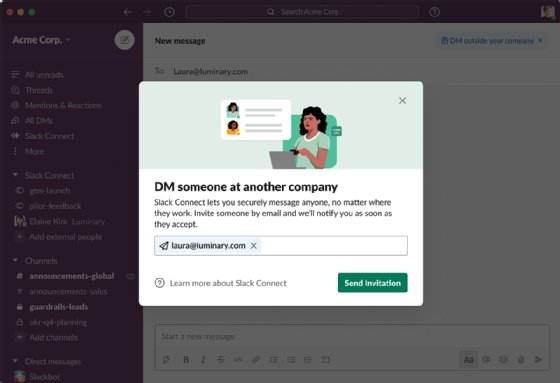Slack has a rocky start with direct messages
Slack launched and then took down within hours the ability for people to direct message anyone on the platform after subscribers complained that the feature could lead to harassment.
Slack turned on Connect DM this week, letting people write a personal note with their request to connect. Soon after, customers took to Twitter to complain that Slack had made them vulnerable to spammers, phishers and people looking to harass others.
Within hours of the launch, Slack took down the personalization feature and apologized for the oversight.
“We are taking immediate steps to prevent this kind of abuse,” said Jonathan Prince, vice president of communications and policy at Slack, in the statement. “We made a mistake in this initial rollout that is inconsistent with our goals for the product and the typical experience of Slack Connect usage.”
Dion Hinchcliffe, an analyst at Constellation Research, said Slack should have known better than to let people send unsolicited messages. “They didn’t take any of the lessons learned from social networks and social media,” he said.
Slack announced Connect DM in October as part of its war on email. The company’s goal was to be the service people turned to for messaging others both within and outside their companies. Before the latest feature, only co-workers could message each other on Slack.
Despite its flawed launch, Connect DM is “very urgently needed” as a faster, more straightforward method than email for cross-company communications, Hinchliffe said. “It encourages smaller bits of communication.”
Late last year, Salesforce said it will acquire Slack for $27.7 billion. The companies expect to close the deal this summer.

Google released Workspace suite for frontline workers
Google has started selling a version of Google Workspace designed for frontline workers.
Google made Workspace Frontline available this week. The service comes with security and communication features tailored to frontline workers in healthcare, retail and emergency services. It also provides access to Gmail, Meet, Chat, Docs, Drive and all other apps available in Workspace’s standard version.
In February, Google announced the rollout of an education tier for Workspace, formerly called G Suite.
Google rival Microsoft has targeted frontline workers through the Teams collaboration app. Last June, Microsoft launched a walkie-talkie feature in Teams to let frontline workers communicate through the app over Wi-Fi or cellular networks. Teams is part of the Microsoft 365 productivity suite.
RingCentral to bolster security with end-to-end encryption
RingCentral acquired cryptographic technology firm Kindite to bolster the security capabilities of its unified communications platform.
The Israeli-based Kindite specializes in cloud security and will help RingCentral roll out end-to-end encryption for its messaging and video conferencing tools. RingCentral announced the acquisition this week.
Heather Hinton, CISO at RingCentral, said in a statement that the deal will help the company build “the highest level of security capabilities” for its global communications platform.” RingCentral did not disclose the terms of the transaction.
Maxim Tamarov is a news writer covering mobile and end-user computing. He previously wrote for The Daily News in Jacksonville, N.C., and the Sun Transcript in Winthrop, Mass. He graduated from Northeastern University with a degree in journalism. He can be found on Twitter at @MaximTamarov.








